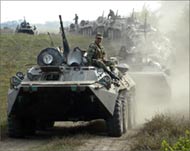Mass grave uncovered in Chechnya
A mass grave containing six unidentified bodies has been discovered in the Chechen capital Grozny during excavation work at a building site, Russia’s NTV television said.

The agency said on Saturday that the six had apparently been shot and buried about three months ago.
The interior ministry in the Russian province was not immediately available for comment.
On Thursday, Chechnya’s newly appointed president, Kremlin ally Alu Alkhanov, told the Council of Europe that respect for human rights was improving in the North Caucasus republic.
He was speaking after the unveiling of a report by the pan-European rights watchdog that said abuse of human rights “remained a catastrophe” in Chechnya, where Russian troops have brutally cracked down on alleged separatists since October 1999.
Genocide watch list
Numerous non-governmental organisations have reported on the abundance of mass graves in the region, to the extent that the Committee on Conscience of the US Holocaust Memorial Museum in 2000 placed Chechnya on its genocide watch list.
Other rights groups, such as Human Rights Watch (HRW), have criticised the Russian government for covering up many cases of torture and mass graves where suspects were murdered then hurriedly buried, without conducting thorough investigations.
The government’s report regarding the treatment of mass graves was deemed as “highly inadequate” on more than one occasion by HRW.
Failures
 |
|
Russia continues to suppress |
HRW has in the past also strongly criticised the international community for being silent and not pressurising Russia to deal with the Chechens in a humane manner.
It says this has given the Russians a green light to continue its human rights violations against Chechens.
Russian rights group, Memorial, which won the UN refugee award for assisting Chechen refugees, has in the past said it knew of other mass graves but was wary of making the information public.
They feared the sites would meet the same fate as a mass grave in the Oktyabrsky district near a police station manned by federal interior ministry troops.
“They blew the building up the same day information leaked to the public,” said Lipkhan Bazayeva of Memorial’s office in Nazran, Ingushetia, citing reports from visitors to her office from Chechnya in April 2001.
“Having started to talk about it too early, we made a mistake – they [the Russians] managed to hide the evidence.”